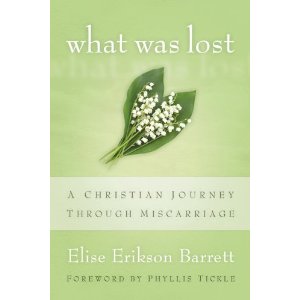 Anyone who has ever had a miscarriage knows that well-meaning people, people who love you, will sometimes say things that they intend to make you feel better but actually have the opposite effect. I asked Elise Erikson Barrett, author of the outstanding new book What Was Lost: A Christian Journey through Miscarriage, to offer some helpful advice about what to say — and what not to say — when someone you know has suffered a miscarriage. (And chances are you will know someone, since miscarriage affects one in every four pregnancies.) What Was Lost is the book I wish I had had at hand when I had a miscarriage. I hope you find it as wise and helpful as I do.
Anyone who has ever had a miscarriage knows that well-meaning people, people who love you, will sometimes say things that they intend to make you feel better but actually have the opposite effect. I asked Elise Erikson Barrett, author of the outstanding new book What Was Lost: A Christian Journey through Miscarriage, to offer some helpful advice about what to say — and what not to say — when someone you know has suffered a miscarriage. (And chances are you will know someone, since miscarriage affects one in every four pregnancies.) What Was Lost is the book I wish I had had at hand when I had a miscarriage. I hope you find it as wise and helpful as I do.
By Elise Erikson Barrett
“Hey how’s it going? How’s your pregnancy?”
“Well, actually…I just had a miscarriage.”
What do you say? If you haven’t had this conversation or one like it, the odds are good that you will someday. Miscarriage, or pregnancy loss that happens before 20 weeks, is incredibly common, affecting as many as one in four pregnancies. It’s a painful loss, with a grieving process that studies have shown is much like the grief after losing a close loved one. But it’s a complicated loss, rarely recognized ritually, and it somehow inspires ridiculously inept responses from well-meaning people who really want to help – especially people of faith.
So here are a couple of lists – a few things not to say to someone who has had a miscarriage, and some ideas about how you might respond helpfully.
WHAT NOT TO SAY
1. Any sentence that starts with “at least.” If you feel those words rising to your lips, just stop. No matter what you’re going to follow it with, it won’t help. The “at least” responses almost always minimize the loss, making a hurting person feel as if the pain she’s experiencing is somehow unreasonable or wrong. We’re tempted to encourage someone who is grieving to “look at the bright side,” or to “count her blessings.” And so we come up with these comments like, “At least you’re young; you can still have other children,” (can they? Have they been struggling with infertility for months or years? Is it really another child they want, or are they grieving that particular child?), or, “At least you were only seven weeks along” (so any grief they’re feeling is out of proportion to the loss).
2. Any sentence that implies that God caused the miscarriage. Common examples include, “Oh, God just needed another little angel in heaven,” “Well, God’s plan is perfect,” or “I’m sure God had a reason for this.” Even if the grieving family eventually comes to a place where they can trace God’s hand through their time of loss, these comments falling on raw ears all sound like, “God killed your baby on purpose, and moreover, you should be thankful.”
3. Any sentence that tries to come up with either a reason the miscarriage happened or a way to prevent future miscarriages. These sound like: “It probably happened because…(you’re so stressed, you’re so skinny, you didn’t slow down, etc.);” “You should…(eat this special diet, take these herbal supplements, take a vacation, etc.).” We’re so tempted to find a reason for tragedies, but unfortunately, looking for a reason in this case triggers guilt in the bereaved woman. She hears these comments as indictments. Because after all, if the loss happened “because” she was stressed or skinny or busy or not eating certain foods or not taking certain supplements, she could have done something to prevent the miscarriage – which means it must have been her fault.
4. “You should try to adopt, and then it’ll work fine. That happened to my…(brother, co-worker, neighbor, etc.).” There are so many things wrong with this comment that it’s hard to know where to begin. In brief: (1) This is like the “fixes” offered above in that it implies that this particular loss is just a bump on the road to having a baby, not a legitimate loss in and of itself (have you ever lost a pet, and had someone say, “Well, are you going to get another dog?” Same concept.) (2) It paints adoption as a fertility treatment, which is appalling. (Do we really think it’s okay to adopt a child as a fix for fertility problems, instead of as a unique and beloved addition to the family in his or her own right? Surely not.)
WHAT TO DO INSTEAD
So many people who would know exactly what to do when faced with a death in a friend’s family feel frozen when it comes to miscarriage. Perhaps it might help us to think of what we might do if a friend or relative lost a sibling, or a parent.
1. Call her up, or pay her a visit. Say, “I heard about your loss, and I am so very sorry. How are you doing?” And then be ready to listen – really listen. She may need to talk to someone about what it was like that night in the hospital, or how it felt when she realized she was losing her baby. She may want to have a safe place to say how angry she is at God, or to talk about her questions about an afterlife. Her partner may need to find a way to sort through his feelings – his sense of distance from or proximity to the loss, his worry about her, his feelings of helplessness.
2. Ask the question, “What can I do to support you?” Then offer some specific ways you’d be able to offer care. Say, “I’d love to bring you dinner on Thursday; is that convenient?” “Could I take your preschooler to the park for a few hours on Saturday so you and your husband can have some time alone together?” “May I could take you to go get lunch on your break today?”
3. Offer concrete acknowledgments of the loss, being sensitive to the fact that nothing you do will “fix” the grief, but trying instead to express love and support and the fact that you take this event seriously. Write a card. Give her a gift certificate for a massage or a pedicure. Take them out to eat. Drop off a gift basket that includes small things that will make them feel cared for – some tea, cookies, a book, a candle, movie vouchers.
4. Pray for her. The simple question, “How can I pray for you?” can often elicit very honest emotions. And then when she and/or her partner have told you what they need from God, then you pray – really pray. Not only will God hear and respond, but you may be given further guidance about your own offered care.
A person’s immediate community has an enormous impact on her or his ability to grieve well after a pregnancy loss. Love well, so you can make space for those you love to grieve well.

